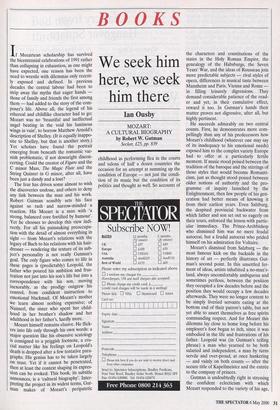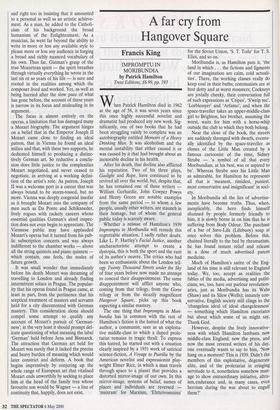BOOKS
We seek him
here, we seek him there
Ian Ousby
MOZART: A CULTURAL BIOGRAPHY by Robert W. Gutman Secker, £25, pp. 839 If Mozartean scholarship has survived the bicentennial celebrations of 1991 rather than collapsing in exhaustion, as one might have expected, one reason has been the need to wrestle with dilemmas only recent- ly exposed and defined. In previous decades the central labour had been to strip away the myths that eager hands those of family and friends the first among them — had added to the story of the com- poser's life. Above all, the legend of his ethereal and childlike character had to go: Mozart was no 'beautiful and ineffectual angel beating in the void his luminous wings in vain', to borrow Matthew Arnold's description of Shelley. (It is equally inappo- site to Shelley, but that is another story.) Yet scholars have found the portrait emerging from beneath the romantic var- nish problematic, if not downright discon- certing. Could the creator of Figaro and the C minor Mass, The Magic Flute and the String Quintet in G minor, after all, have been just a dandy and a lout? The fear has driven some almost to wish the discoveries undone, and others to deny any link between the man and his work. Robert Gutman sensibly sets his face against so rash and narrow-minded a reaction. His Mozart is a man with 'a strong, balanced core fortified by humour'. Yet he chooses to develop this view indi- rectly. For all his painstaking preoccupa- tion with the detail of almost everything in sight — from Mozart's relations with the legacy of Bach to his relations with his hair- dresser — rendering the texture of its sub- ject's personality is not really Gutman's goal. The only figure who comes to life in these pages is (predictably) Leopold, the father who poured his ambition and frus- tration not just into his son's life but into a correspondence with his son, moving inexorably, as the prodigy outgrew his control, from confident instruction to emotional blackmail. Of Mozart's mother we learn almost nothing expressive; of Nannerl, the sister who spent her child- hood in her brother's shadow and her adulthood in her father's, hardly more.
Mozart himself remains elusive. He flick- ers into life only through his own words: a major question like his obsessive scatology is consigned to a priggish footnote, a cru- cial matter like his feelings on Leopold's death is dropped after a few tentative para- graphs. His genius has to be taken largely on trust. Yet if it cannot be penetrated, then at least the context shaping its expres- sion can be evoked. This book, its subtitle announces, is a 'cultural biography'. Inter- preting the project in its widest terms, Gut- man makes of Mozart's peripatetic childhood as performing flea in the courts and salons of half a dozen countries the occasion for an attempt at summing up the condition of Europe — not just the condi- tion of its music but the condition of its politics and thought as well. So accounts of the characters and constitutions of the states in the Holy Roman Empire, the genealogy of the Habsburgs, the Seven Years' War, and the ideas of Rousseau join more predictable subjects — rival styles of opera, differences in musical taste between Mannheim and Paris, Vienna and Rome in filling leisurely digressions. They demand considerable patience of the read- er and yet, in their cumulative effect, reward it too. In Gutman's hands their matter proves not digressive, after all, but highly pertinent.
He succeeds admirably on two central counts. First, he demonstrates more com- pellingly than any of his predecessors how Mozart's childhood (whatever one may say of its inadequacy to his emotional needs) exposed him to the complex variety Europe had to offer at a particularly fertile moment. If music stood poised between the tradition of the baroque and the stirrings of those styles that would become Romanti- cism, just as thought stood poised between older notions of authority and the pro- gramme of inquiry launched by the Enlightenment, then few people of his gen- eration had better means of knowing it from their earliest years. Even Salzburg, the despised provincial backwater from which father and son set out so eagerly on their tours, enforced the lesson with partic- ular immediacy. The Prince-Archbishop who dismissed him was no mere feudal autocrat, but a feudal autocrat who prided himself on his admiration for Voltaire.
Mozart's dismissal from Salzburg — the most famous kick on the backside in the history of art — perfectly illustrates Gut- man's second point. In this unsettled fer- ment of ideas, artists inhabited a no-man's- land, always uncomfortably ambiguous and sometimes perilous, between the position they occupied a few decades before and the position they would occupy a few decades afterwards. They were no longer content to be simply liveried servants eating at the bottom end of their patron's table, but not yet able to assert themselves as free spirits commanding respect. And for Mozart this dilemma lay close to home long before his employer's foot began to itch, since it was embodied in the life and frustrations of his father. Leopold was (in Gutman's telling phrase) a man who yearned to be both salaried and independent, a man by turns servile and over-proud, at once hankering — and vainly on both counts — after the secure title of Kapellmeister and the entree to the company of princes.
Gutman is undoubtedly right in stressing the confident eclecticism with which Mozart responded to the variety of his age, and right too in insisting that it amounted to a personal as well as an artistic achieve- ment. As a man, he added to the Catholi- cism of his background the broad humanism of the Enlightenment. As a musician, he went far beyond the ability to write in more or less any available style to please more or less any audience in forging a broad and richly nuanced vocabulary of his own. Thus far, Gutman's grasp of the true Mozartean spirit — the spirit breathes through virtually everything he wrote in the last six or so years of his life — is sure and rooted in the realities among which the composer lived and worked. Yet, as well as being hurried after the slow pace of what has gone before, the account of these years is narrow in its focus and misleading in its argument.
The focus is almost entirely on the operas, a limitation that has damaged many a Mozart biography. The argument hinges on a belief that in the Emperor Joseph II Mozart came close to finding an ideal patron, that in Vienna he found an ideal milieu and that, with these two supports, he dedicated himself to producing a distinc- tively German art. So reductive a conclu- sion does little justice to the complexities Mozart negotiated, and never ceased to negotiate, in arriving at a working defini- tion of the artist's role. As patron, Joseph II was a welcome port in a career that was always bound to be storm-tossed, but no more. Vienna was deeply congenial insofar as it brought Mozart into the company of men such as Da Ponte and Schikaneder, lively rogues with rackety careers whose essential qualities Gutman's aloof inspec- tion does not even begin to appreciate. The Viennese public may have • applauded Mozart's operas but it turned from his pub- lic subscription concerts and was always indifferent to the chamber works — above all the string quintets and piano quintets which contain, one feels, the nodes of future growth.
It was small wonder that immediately before his death Mozart was dreaming of travelling to London and already finding intermittent solace in Prague. The popular- ity that his operas found in Prague came, at least in part, from the pertinence that his sceptical treatment of masters and servants held for a city discontented with German mastery. This consideration alone should compel some attempt to qualify any account of Mozart's pursuit of `German- ness'; at the very least it should prompt del- icate questioning of what meaning the label `German' held before Jena and Bismarck. The attraction that German art held for Mozart was surely that it lacked the precise and heavy burden of meaning which would later constrict and deform. A book that begins impressively by conjuring up the whole range of European art that vitalised Mozart ends unworthily by seeking to place him at the head of the family tree whose favourite son would be Wagner — a line of continuity that, happily, does not exist.



































































 Previous page
Previous page